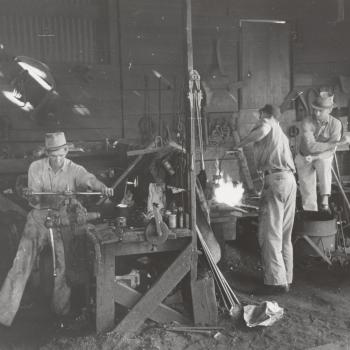Cardinal Francis George, OMI (1937-2015) of Chicago was fond of controversial quips. Here’s one: “All Christians in the U.S. are Calvinists, including the Catholics.” He obviously did not mean that everyone belonged to a Reformed congregation. He meant that we are Calvinists because all of us understand the relation between salvation and worldly accomplishment in Calvinist terms.
The Protestant work ethic is an odd outgrowth of the Reformation and maybe even of John Calvin (1509-1564). After all, the big theme of the Reformation was a return to the theology of St. Augustine (354-430), who taught that salvation is exclusively through God’s free gift of grace. No worldly effort can win God’s love.
Calvin did say that work glorifies God. OK so far. Further, an intense vocation is compatible with God’s will. That’s OK too unless the worker assumes that intense worldly activity is a source of salvation. Soon enough workers wanted to know if they are saved. Prosperity, people then concluded, is an approximate indication of one’s standing with God. The original Reformation idea slides away as material success reflects superior virtue. This is the famous Protestant work ethic.
Deep down a successful person likely suspects that she or he was not admitted to an Ivy League college entirely on merit, writes Michael Sandel of Harvard University in The Tyranny of Merit (Farrar Straus, 2020). And a young worker whose job is outsourced doubts now and then that his or her plight is from lack of virtue. Of course, neither the successful person nor the left-behind person picks up a copy of Max Weber’s (1864-1920) The Protestant Ethic and the Spirit of Capitalism (Penguin, 1904) to quiet their qualm. But, as Sandel explains, both young adults generally accept how our culture justifies unfairness. Success, our culture says, is a human achievement; the result of hard work alone. A fortunate person, the message continues, can have confidence that prosperity is deserved.
Our meritocracy is not in itself selfish, Sandel quickly adds. When it comes to Christians in our society, there is great generosity. For example, the Pew Research Center finds that church-going types give more time and money to community service than others. About 70% of church-goers understand that helping the needy “is an essential part” of faith. As church attendance continues to decline, social service leaders warn of jeopardy particularly in the areas of homelessness, addiction, education (tutoring), assistance to the unemployed, treatment for HIV-AIDS, affordable housing and food pantries.
The Protestant work ethic is embedded in ordinary language. For example, given enough time someone at the barbershop or at the bar will likely say: “Work hard and play by the rules and you will go as far as your talents can take you.” Really? What if you work very hard and your line of work is outsourced or the economy in your state is in rapid decline? What if unexpectedly your young daughter needs medical treatment beyond your means to pay? Do you deserve assistance?
The Protestant work ethic is embedded not only in casual language but in social policies. For example, we regularly distinguish between the undeserving poor (their misfortune is a sign of deficient character and bad choices) from the deserving poor and deserving working class. Let’s say a stranger comes to the church looking for a handout. Are they greeted with a bevy of questions? Are the undeserving (the con artists) turned away? What if the person returns week after week?
Make no mistake, Sandel concludes. Those left behind internalize the premise of our meritocratic work ethic. They perceive the condescension of the successful, though the put down is not explicit and the successful are not mean at all. The underemployed have feelings of self doubt. Their percolating humiliation can at times be mixed with resentment to trigger protest, sometimes violence.
About 100 years after the death of St. Francis Assisi (1181-1226) a group of Franciscans in Southern France taught that neither Jesus Christ nor the apostles owned property, even in common. This disturbed Church officials and threatened Pope John XXII (1244-1334). Given the mindset of the day, this teaching makes the property and possessions of the pope and all the Churches Biblically illegitimate. Unless, that is, the teaching is false. A gathering of Franciscan officials, balancing the obvious truth with a possible escape hatch for the pope, asserted that Jesus used things but claimed no ownership. That was not enough wiggle room for the pope. He issued a decree: It is heresy to say that Christ had no property. Thus about 200 years before the Reformation, there began an accommodation of Christianity and worldly success.











